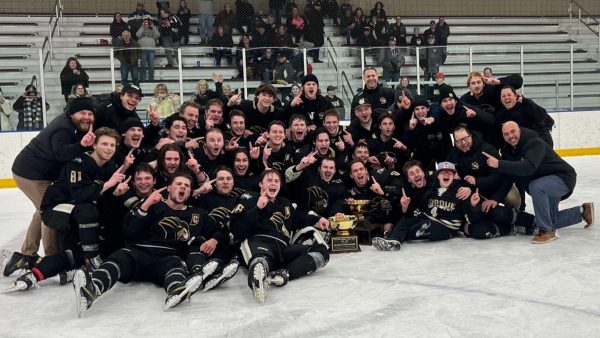EXL: “…Is it a fine program for PNW?”
PNW Faculty Senate Committee debates EXL program
The PNW Faculty Senate Committee has been working throughout the semester to create an experiential learning program to fit the needs of the students of both campuses.
Currently, there is no deadline set for when the program will be completed. Students who started their undergraduate degree at the former PUC will still have to complete two experiential learning courses as part of its system created in 2005. Students who began at PNC are not required to take any EXL courses, though they are encouraged to do so by the university to build up their resumes.
Geoffrey Schultz, co-chair of the Faculty Senate Committee, and Daniel Wilbur, chair of the Faculty Senate Committee, said that prior to the program being finalized, it still needs to be debated at the Senate. An infrastructure needs to be established, and an assessment policy for the end of each course needs to be created. Schultz said that ideally the committee will vote on a new EXL program by December or January once it is created by the Executive Committee.
“Experiential learning was a fine program for the Calumet campus, but is it a fine program for PNW?” Wilbur said.
Judy Hack, associate professor of Hospitality and Tourism Management and member of the Faculty Senate Committee, has had a vested interest in experiential learning, as she has been a part of the program since its inception at PUC.
“It’s been good for our students,” Hack said. “Just because we are merged with another university, why should we do away with something that is beneficial for our students? I don’t know whether people on the Westville campus don’t want to talk about EXL because they don’t know anything about it, don’t understand it or don’t want it. I find frequently that people are against what they know nothing about.”
Wilbur said that he believes there is a belief that faculty members from the Westville campus do not want an Experiential Learning Program, which he says is not true.
“Westville has no negative perception with EXL,” Wilbur said. “Somehow it got translated to they don’t want it. I believe there is a vocal minority on both campuses that is speaking on behalf of themselves.”
Schultz and Wilbur both said that EXL will most likely always have a presence at PNW to some degree, but it is to be determined how it will apply to each major.
“We are asking if the program makes sense for all majors,” Wilbur said. “For example, HTM is an obvious candidate for EXL, but what could the choices be for math majors?”
There is a possibility that EXL courses will remain a graduation requirement for some majors but that it won’t be required universitywide. Hack does not believe that this compromise would be beneficial for the growth of PNW.
“I don’t see a compromise with EXL,” Hack said. “If anything we need to increase what we are doing.”
Currently, English 105 is a required course for all students and it’s also an EXL course, meaning that former PUC students only had to take one other EXL course in order to graduate; however, the Faculty Senate Committee is currently debating whether English 105 should be considered an EXL course.
“English 105 does not feel like an EXL course,” Wilbur said. “An EXL course is supposed to feel more like a job.”
The Oct. 14 Faculty Senate Committee meeting began with Hack asking that the informational policy statement on Experiential Learning be removed from the agenda due to inappropriateness, as it had not yet been discussed by the standing committees. During the following Faculty Senate meeting Nov. 11, there was a half-hour debate started by Hack about the curriculum document involving adding a checkbox in regards to EXL. From there, the committee had a debate about having a secret ballot to forward that discussion to the following Faculty Senate meeting, as the discussion was lasting a long time. Finally there was a debate about the legalities of a secret ballot system. The series of discussions ended with talks of creating a disclaimer for the curriculum that would state if a class was currently recognized as an EXL course. Schultz said that he didn’t expect the EXL discussions to get as complicated as they did.
“We had front burner issues at the beginning of the year, and EXL was not one of them, but now it has made its way up to where it has to be one,” Schultz said.
Hack said she had offered to host a PowerPoint presentation at the Westville campus to go over the importance of experiential learning, but she was denied.
Although it is yet to be decided whether the first class of PNW students will have an EXL graduation requirement, students are allowed and encouraged to take EXL courses. There are currently about 90 EXL courses offered at PNW.
Candice Ford, PUC spring 2016 graduate and former Student Government president, said that her experiential learning experience is one of the high points of her resume.
“If it weren’t for me being in the military, I’d say experiential learning is the most valuable for me getting an actual career started,” Ford said. “Sure, I was involved on campus, obviously, but it doesn’t have the same measure as actual experience in the field.”
PUC was able to create the EXL program in 2005 after receiving a $1.7 million grant from the Federal Department of Education, which was spent by 2011. Although there is the possibility that the university could apply for the grant again, Schultz doubts that it would be a possibility due to the results of the presidential election.
“I don’t know if it is a possibility if the president elect follows through with his threat to shut down the Department of Education,” Schultz said.



